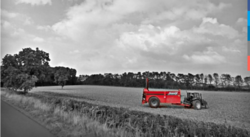
A Chinese company recently bought nearly 1,000 hectares of French farmland. Pourquoi? "To put French cereals on Chinese tables," its owner says.
Baguettes In Beijing? Chinese investors eating up French farm land
by Edouard de Mareschal
LE FIGARO
CHEVAGNES — Since November, 900 hectares (2,224 acres) of land in the central French region of Allier have been acquired by a foreign power. The conquest was carried out without weapons or violence, but in the secrecy of various meetings of Chinese boards of directors at French notary offices.
Why did they do it? What are their plans for the land? To these questions, Mayor Daniel Marchand of Thiel-sur-Acolin — one of the municipalities where the now Chinese-owned estates are located — is waiting for answers. "I can't tell you anything purely and simply because I haven't been told anything at all," he says. "We would have liked to have met the owners, or at least their representatives. For a mayor, knowing what's going on in your municipality is the least you can do."
The new owner is a subsidiary of a Chinese company, Reward Group International. This consortium, whose sprawling activities range from real estate to the production of household cleaning products and food processing, has a very clear goal as far as France is concerned: "To put French cereals on Chinese tables."
Its director, Keqin Hu, boasts that he now owns eight large farms in France. To meet the growing demands of the Chinese middle class, he wants to open a chain of high-end bakeries, all the while controlling the entire industrial process, from harvesting French wheat to opening bread and pastry stalls in China. In his acquisitions, Keqin Hu voices a national imperative: "To develop industry in service of the homeland."
There's more to the acquisition than just short-term industrial and commercial concerns — it's also a strategic investment. "It's a simple equation: China has 20% of the world's population and less than 10% of arable land to feed it," says Christophe Dequidt, co-author of a book entitled Tour du monde des moissons (harvests around the world), which explores the agricultural systems of 15 countries, including China.
"They simply have to look abroad," he adds. "And the French agricultural model is highly valued for its efficiency and know-how."
A huge amount of available capital.
The acquisition of French land can also be a purely financial move, as agricultural engineer Marie-Hélène Schwoob explains. "In a country like China, where growth is written with double-digits, there is a huge amount of capital available," she explains. "Investors, therefore, may be tempted to shelter their assets in bricks and mortar or in land. Not to mention that it also offers opportunities for tax optimization."
The Reward Group International purchase has created quite a buzz in the French media. But the Chinese are by no means the only ones investing in French land. The French do it too, of course, as do Germans, Belgians, Dutch and others. Over the past decade, 20% of France's agricultural land has been taken over by foreign companies, and the trend is accelerating.
Prior to the deal he reached in Allier, Keqin Hu made a similar purchase in Indre, another part of central France. Between the end of 2014 and April 2016, his Hong Yang investment fund purchased several agricultural companies in Châtillon-sur-Loire, Vendœuvres or Clion, for a total area of 1,700 hectares (4,200 acres) of land. For these operations, he can always count on the help of Marc Fressange, a French businessman who founded a company that exports local French products to China.
Everything there still needed to be done.
In the Allier region, the Reward Group International purchase has faced local opposition, in part because of the amount of money involved: between 10 and 12 million euros, by some accounts. While some people say there are too many factors involved to properly assess the per-hectare price, others, like Jean-Paul Dufrègne, a local deputy with the Communist Party, say it was well above the going rate and thus distorts the market for everyone else. "The consequence is simple," he says. "It creates land pressure that makes the land inaccessible to young farmers."
Indeed, the financial operation didn't go unnoticed by local young farmers. Together with his business partner, Jean Taboulot runs a farm with 360 heads of Charolais cattle. But in his youth, Jean used to work for the farmer who sold his land to the Chinese. "I will never speak ill of this man," he says from the outset. "Mr. M. invested in the 1980s, at a time when we needed it. Everything there still needed to be done: drains, irrigation installations."
But, when the owner decided to sell his farm, Taboulot explains, it was impossible for any young farmer to compete. "It's unfortunate, but the banks are no longer doing their job," he says. "They invest crazy sums of money to display their logos on racing yachts, but there's no one left to help a young farmer get started."












